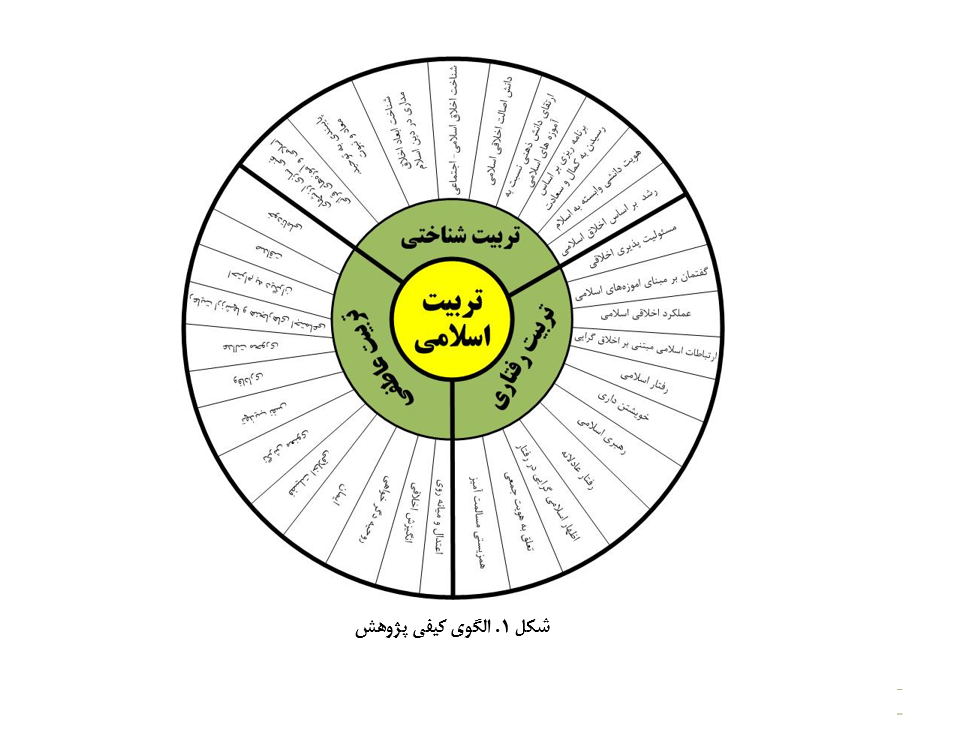ارائه الگوی کیفی تربیت اسلامی در مدارس دوره متوسطه شهر تهران با روش داده بنیاد
کلمات کلیدی:
الگوی کیفی, تربیت اسلامی, مدارس دوره متوسطه, روش داده بنیادچکیده
یکی از موثرترین راههای تعلیم و تربیت اسلامی در یک جامعه، شروع این نوع تربیت از مدارس است. هدف از این پژوهش ارائه الگوی کیفی تربیت اسلامی مدارس دوره متوسطه شهر تهران است. روش پژوهش حاضر، ار نوع کیفی بود و از لحاظ هدف جزء پژوهشهای کاربردی / بنیادی بود. ابزار پژوهش، مصاحبه نیمه ساختار یافته، بررسی اسناد و بررسی صفحات وب به عنوان رسانه دیداری جهت اعمال چندجانبهگرایی بودند. جامعه هدف شامل خبرگان علمی و تجربی در زمینه تربیت اسلامی مدارس بود. جهت تجزیه و تحلیل از روش کیفی، داده بنیاد استفاده شد. تعداد نمونهها از ابتدا مشخص نبوده و نمونه گیری تا رسیدن به اشباع نظری ادامه یافت. نتایج بررسیها نشان داد که مولفههای تربیت اسلامی شامل، تربیت شناختی، تربیت عاطفی و تربیت رفتاری است. در نهایت با توجه به مولفههای شناسایی شده، مدل نهایی پژوهش ارائه شد. براساس یافتهها میتوان نتیجه گرفت که تربیت اسلامی در مدارس امری چندبعدی است لذا مسئولان و متولیان امر آموزش و تعلیم و تربیت باید بتوانند بر اساس تمام مؤلفههای تاثیر گذار در جهت الگوی مطلوب تربیت اسلامی قدم بگذارند.
دانلودها
مراجع
Darbandi M, Darbandi M, Amini M, editors. Islamic Education for Students from the Perspective of the Explanation Model. 5th National Conference on Professional Research in Psychology and Counseling with a Teacher's Perspective; 2023.
Didgah Z, Shariati S, Beheshti S, Imani Nayini M. Explaining the Role of Responsibility in the Social Education of Adolescents Based on the Interpretation of Al-Mizan. Culture of Counseling and Psychotherapy. 2018;9(34):27-56.
Barfar K, Ranjbarian R. The Impact of Teacher Characteristics in Islamic Education on the Islamic-Iranian Progress Model. Scientific Quarterly of Studies on Islamic-Iranian Progress. 2023.
Haj Khazimeh M. Examining the Relationship Between Teachers' Professional Ethics and Organizational Health in Public Boys' Elementary Schools in Tehran. University of Tehran2015.
Khosrojerdi A, editor Examining the Importance of Islamic Education for Students. 5th National Conference on Professional Research in Psychology and Counseling with a Teacher's Perspective; 2023.
Samadi Miyarkalaei H, Samadi Miyarkalaei H, Babayi A, Asgari A, editors. The Effects of Ethics on Entrepreneurship and Business. National Conference on Entrepreneurship and Management of Knowledge-Based Businesses; 2012; University of Mazandaran.
Mohammadi Bastanouei M, editor The Position and Role of Education in Islamic Modern Civilization. 3rd International Conference on Educational Sciences, Psychology, Counseling, and Education; 2023.
Bavafa Kharaqei MB, Savari H, editors. The Role of Good Morality in the Educational Process of Students. 2nd International Conference on Research in Accounting, Management, Economics, and Humanities; 5th National Conference on Professional Research in Psychology and Counseling with a Teacher's Perspective; 2023.
Khari Arani M, Rahnama A, Sobhani Nejad M. Comparative Study of Philosophical Foundations of Moral Education from the Perspectives of Allameh Tabatabai and Levinas. 2020.
Heslep RD. Moral Education for American. Westport, CT: PraegarER -; 2015.
Zare S, Karami F, Pourmohammad M. The Impact of Need-Based Teaching Methods in the Course 'Life Skills' on Moral Education of Student Teachers at Farhangian University in Gilan Province. Epistemological Studies in Islamic Universities. 2021;87:557-72.
Kiayi Z, Abolmalali K, Bagheri F. The Existential Structure of Humans in the Quran and Its Application in Educational Areas Based on the Fundamental Transformation Document of Education. Research on Issues in Islamic Education. 2021;50:135-75.
Koushi Z, Mousapour Nm, Mohbi A, Armand M. Identifying Dimensions and Components of Moral Education with a Social Approach. Quarterly Journal of Applied Issues in Islamic Education. 2018;3(2):117-42. doi: 10.29252/qaiie.3.2.117.
Goli S, Dousti M, Dousti Z, Goli M, editors. Foundations of Islamic Education. 3rd National Conference on Psychology, Education, and Lifestyle; 2019.
Lo Piano S. Ethical principles in machine learning and artificial intelligence: cases from the field and possible ways forward. Humanities and Social Sciences Communications. 2020;7(1):1-7. doi: 10.1057/s41599-020-0501-9.
Gaspar M. Ethical considerations in Music Education: The professional development of guitar ensemble instructors for Singapore's Ministry of Education (MOE) schools. Academia Letters. 2022;2. doi: 10.20935/AL4597.
Jannat T, Alam SS, Ho YH, Omar NA, Lin CY. Can corporate ethics programs reduce unethical behavior? Threat appraisal or coping appraisal. Journal of Business Ethics. 2022;176(1):37-53. doi: 10.1007/s10551-020-04726-8.
Mohammadi Nayini M, Hosseini M, editors. The Position of Student Education from the Perspective of Islamic Thinkers with an Emphasis on Synthesis Research. 5th National Conference on Professional Research in Psychology and Counseling with a Teacher's Perspective; 2023.
Moradhasel M. Correct Methods of Education. Qom: Spiritual Research; 2018.
Pournajaf E, Seyedi Jorbandi SF, editors. Teacher and Moral Education from the Perspective of Martyr Motahari. 4th International Conference on Humanities and Education; 2018; Tehran.

دانلود
چاپ شده
ارسال
بازنگری
پذیرش
شماره
نوع مقاله
مجوز
حق نشر 2025 HossienReza ShamlooJany, Hadi Rezghi Shisavar, Hamid Shafizadeh (Author)

این پروژه تحت مجوز بین المللی Creative Commons Attribution-NonCommercial 4.0 می باشد.










